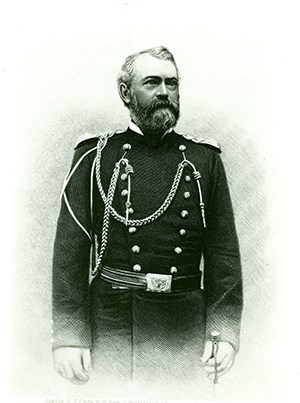Commanding OfficersBy the time Capt. Hart transferred from Fort Larned and turned command over briefly to Capt. James Snyder, activity was slowing down considerably at the post. Although only in command for a month, Capt. Snyder initiated a post beautification program by having the soldiers plant live trees in the place of torn out tree stumps around the parade field. In March Maj. Dodge arrived from Fort Lyon to take command of the post while Capt. Snyder went to Fort Hays as a court-martial witness. |

Public Domain While stationed at West Point, he married Julia Rhinelander Paulding from New York on March 3rd, 1858. The two were married on March 3rd in Calvary Church in New York City. They had one son, Frederick Paulding Dodge. When the Civil War broke out in April of 1861, Lt. Dodge was stationed at Fort Wood, NY. He chose to stay with the Union rather than resign his commission and fight for the Confederacy as many Southern born officers would do. On May 3, 1861, he was promoted to Captain, 8th Infantry. During the war he held mostly administrative posts related to recruiting and disbursement, although he did participate in the First Battle of Bull run on June 1, 1861. He was promoted to Major of the 12th U.S. Infantry on June 21, 1864, and to Brevet Lt. Col. on March 30, 1865, for “meritorious and faithful services in the recruitment of the Armies of the United States. He continued in a recruitment and disbursement capacity in Pennsylvania and New York until February of 1867 when he was transferred back to frontier duty at Fort Sedgwick, Colorado Territory as part of the 30th U.S. Infantry. On March 15, 1869, he was transferred to the 3rd U.S. Infantry and then placed in command of Fort Lyon from October 12, 1869, until February 23, 1871. He was transferred to Fort Larned, where he assumed command on March 13, 1871. Events at Fort Larned throughout the spring and summer of 1871 were relatively mundane matters. Such things duty changes, anticipating the prospect of a good harvest from the company gardens, or escorting a representative of the Atchison, Topeka and Santa Fe Railroad were punctuated by a few exciting incidents. In March, around the time Maj. Dodge assumed command 41 soldiers deserted from the post. This was about the same time the paymaster arrived with the news that the monthly pay for privates had been reduced to $15, as well as a reduction in their clothing allowance. Lt. Thompson took a squad of men out to look for the deserters but wasn’t able to find them. The following month a Private Mickey came on guard duty after spending time in the sutler’s bar. When he talked out of turn the sergeant hit him on the side of the head with his rifle butt. He was taken to the post hospital where Surgeon Laing determined that he was indeed drunk but did not worry too much about him since he appeared lucid enough to answer questions. By the next morning, though, he was dead, and an autopsy showed that he had a fractured skull. In May the post sutler, Henry Booth, start participating in activities that would eventually earn him bad marks for his time as the post trader. His first offense was selling liquor by the drink to both civilians and enlisted men without first getting the permission of the post commander. He would later have the commander’s permission to sell alcohol between “guard mount” and “retreat.” Although mostly absent from the area for a while some Indians made an appearance in the area around Fort Larned June. They ran off 14 horses and mules from some local ranch owners who lived four miles east of Fort Larned. On the north branch of Pawnee Fork another band of Indians ran off 70 mules. Reports of a large number of Indians camped at Medicine Lodge Creek 70 miles south of Fort Larned, prompted Maj. Dodge to ask for a cavalry company to deal with the situation. He had only 97 men from the 3rd U.S. Infantry at Fort Larned, hardly a force to go after mounted Indians raiding the countryside. Residents in the Walnut Creek area near Fort Zarah spoke with 400 Pawnee warriors traveling with women and children who said they were heading south for a meeting with Comanche. They told the residents that they lived in peace with the whites. By July 9, 1871, Maj. Dodge had been called away to special duty in New York and command of the post passed to Captain George E. Head. Maj. Dodge returned to frontier duty the following year to command Fort Dodge. His remaining Army career involved a series of commands and assignments on the frontier. He commanded various posts in Kansas, Nebraska and Indian Territory, as well as participating in several campaigns against the remaining plains Indians. He was promoted to Lt. Col. on March 15, 1869, and to Colonel of the 11th U.S. Infantry on June 26, 1882. Col. Dodge retired on May 19, 1891, and died on June 16, 1895. Although it would be another seven years before the Army closed Fort Larned, by the summer of 1871 it was obvious from the Fort’s rolls that the Army had very little to do in the area around the post. Indians in the area were now a rarity rather than a regular occurrence and events at the post were more concerned with mundane daily routines instead of chasing and fighting Indians, or escorting wagon trains. |
Last updated: February 20, 2024
